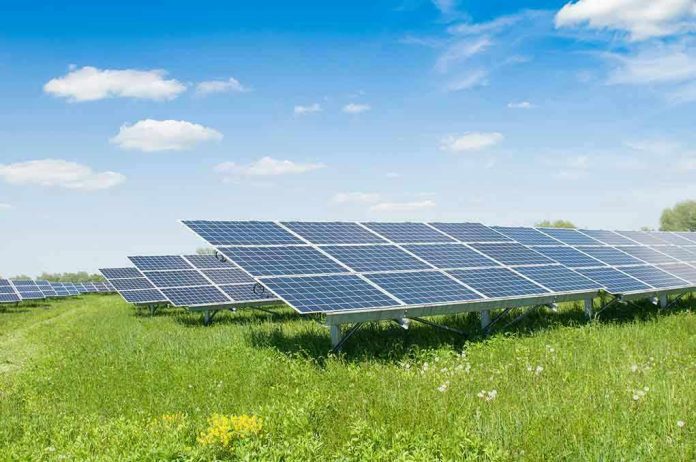
The recent directive to curtail solar and wind projects on federal lands highlights a significant policy reversal, favoring fossil fuels over renewables.
Story Highlights
- DOI mandates personal sign-off by the Interior Secretary for all solar and wind projects.
- New criteria prioritize energy density, favoring fossil fuel and nuclear projects.
- Federal incentives for renewable energy have been rolled back.
- Offshore wind leasing is halted due to efficiency concerns.
Trump Administration’s Energy Policy Shift
In a decisive move reflecting its commitment to fossil fuels, the Trump administration has significantly altered the landscape for renewable energy projects. As of July 2025, the Department of the Interior (DOI) has been directed to enforce stringent new criteria for solar and wind energy projects on federal lands. This policy shift follows the signing of the One Big Beautiful Bill Act, which rolled back numerous incentives for renewable energy.
The new directives require all projects to undergo an elevated review process, with the Interior Secretary personally approving each application. This centralization of authority aims to ensure that only projects that meet or exceed the energy density of fossil fuels and nuclear power are advanced. The administration argues this approach will enhance energy efficiency and land optimization, aligning with their broader energy dominance strategy.
Impact on Renewable Energy Development
These changes are poised to significantly impact the renewable energy sector. Developers now face increased scrutiny and potential delays, with many projects likely to be stalled or canceled. This policy not only affects onshore projects but also halts all offshore wind leasing, a move justified by concerns over environmental impact and energy inefficiency.
Environmental groups and clean energy advocates have criticized these measures as a deliberate effort to undermine renewables in favor of traditional energy sources. They argue that such policies could jeopardize the U.S.’s position in the global renewable energy market and hamper progress on climate action goals.
Broader Economic and Political Implications
The rollback of renewable energy incentives and the introduction of stringent permitting criteria have broader implications. Economically, this could result in job losses within the renewable sector and a shift in investment towards fossil fuels and nuclear energy. Politically, these actions may deepen partisan divides over energy policy, potentially prompting countermeasures at state levels.
WINNING!!!
No more windmills on farmland!https://t.co/pzxZdvx3kG
— Steve A (@SteveV35B) August 19, 2025
While proponents of the policy assert it will lead to more thorough evaluations and optimal land use, critics warn of the potential stifling effect on innovation and clean energy technology deployment. The shift in focus away from renewables could also lead to higher energy prices and reduced progress in addressing climate change.
Sources:
Wind and Solar Projects Face Increased Oversight as Clean Energy Incentives Fade
Trump Administration Order Requires Interior Secretary Sign-Off on Wind, Solar Projects
Interior Department Wind and Solar Land Use
Department of the Interior Offshore Wind and Solar Leasing
Interior’s New Solar and Wind Policy Sparks Concerns of Shadow Ban




